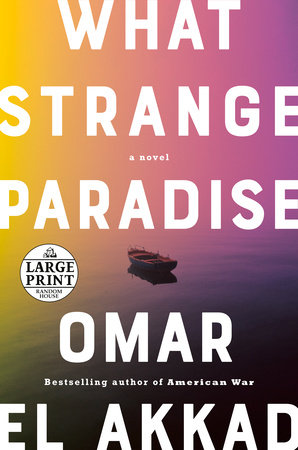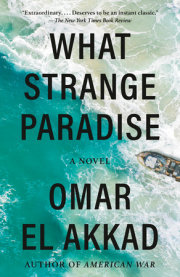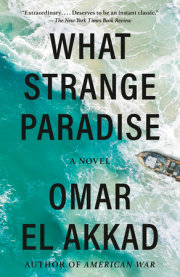Chapter One
After the child lies on the shore. All around him the beach is littered with the wreckage of the boat and the wreckage of its passengers: shards of decking, knapsacks cleaved and gutted, bodies frozen in unnatural contortion. Dispossessed of nightfall’s temporary burial, the dead ferment indecency. There’s too much of spring in the day, too much light.
Facedown, with his arms outstretched, the child appears from a distance as though playing at flight. And so too in the bodies that surround him, though distended with seawater and hardening, there flicker the remnants of some silent levitation, a severance from the laws of being.
The sea is tranquil now; the storm has passed. The island, despite the debris, is calm. A pair of plump orange-necked birds, stragglers from a northbound flock, take rest on the lamppost from which hangs one end of a police cordon. In the breaks between the wailing of the sirens and the murmur of the onlookers, they can be heard singing. The species is not unique to the island nor the island to the species, but the birds, when they stop here, change the pitch of their songs. The call is an octave higher, a sharp, throat-scraping thing.
In time a crowd gathers near the site of the shipwreck, tourists and locals alike. People watch.
The eldest of them, an arthritic fisherman driven in recent years by plummeting cherubfish stocks to kitchen work at a nearby resort, says that it’s never been like this before on the island. Other locals nod, because even though the history of this place is that of violent endings, of galleys flipped over the axis of their oars and fishing skiffs tangled in their own netting and once, during the war, an empty Higgins lander sheared to ribbons by shrapnel, the old man is still, in his own way, right. These are foreign dead.
No one can remember exactly when they first started washing up along the eastern coast. But in the last year it has happened with such frequency that many of the nations on whose tourists the island’s economy depends have issued travel advisories. The hotels and resorts, in turn, have offered discounts. Between them, the coast guard and the morgue keep a partial count of the dead, and as of this morning it stands at 1,026 but this number is as much as an abstraction as the dead themselves are to the people who live here, to whom all the shipwrecks of the previous year are a single shipwreck, all the bodies a single body.
Three officers from the municipal police force pull a long strip of caution tape along the breadth of the walkway that leads from the road to the beach. Another three wrestle with large sheets of blue boat-cover canvas, trying to build a curtain between the dead and their audience. In this way the destruction takes on an air of queer unreality, a stage play bled of movement, a fairy tale upturned.
The officers, all of them young and impatient, manage to tether the fabric to a couple of lampposts, from which the orange-necked birds whistle and flee. But even stretched to near-tearing, the canvas does little to hide the dead from view. Some of the onlookers shuffle awkwardly to the far end of the parking lot, where there’s still an acute line of sight between the draping and four television news trucks. Others climb on top of parked cars and sweep their cameras across the width of the beach, some with their backs to the carnage, their own faces occupying the center of the recording. The dead become the property of the living.
Oriented as they are, many of the shipwrecked bodies appear as though to have been spat up landward by the sea, or of their own volition to have walked out from its depths and then collapsed a few feet later. Except the child. Relative to the others he is inverted, his head closest to the lapping waves, his feet nestled into the warmer, lighter sand that remains dry even at highest tide. He is small but somewhere along the length of his body marks the sea’s farthest reach.
A wave brushes gently against the child’s hair. He opens his eyes.
At first he sees nothing, his sight hampered by the sting of salt and sand and strands of his own matted hair in his eyes. His surroundings appear to him as if behind frosted glass, or on the remembering end of a dream.
But other senses awake. He hears the sound of the sea, tame and metronomic. And beneath that, the hushed conversation of two men, inching closer to where he lies.
The child blinks the silt from his eyes; the world begins to take shape. To his left the beach curves in a long, smooth crescent until it disappears from view behind the rise of a rocky hill lined with thin, palm-like trees. It is a beautiful place, tropical and serene.
For a moment he doesn’t register the dead, only their belongings: ball caps and cell phones and sticks of lip balm and forged identification cards tucked into the cheapest kind of waterproof container, tied-up party balloons. Bright-orange life vests, bloated as blisters, some wrapped around their owners, others unclaimed. A phrase book. A pair of socks.
The boy’s neck is stiff and it hurts to move, but he turns slightly in the direction of the sea. In the shallows sits a rubber dinghy outfitted with police lights. Farther out, the water sheds its sandy complexion and turns a turquoise of such clarity that the tourists’ sailboats seem to float atop their own shadows.
Two men approach. Baggy white containment suits cover their bodies and white gloves their hands and white masks their faces, and vaguely they remind the boy of astronauts. They move slowly around and over the bodies, occasionally nudging at them with their feet and waiting for a response. Some of the corpses they inspect wear small glittering things around their fingers or necks. The boy watches, unmoving, as the masked workers bend down and carefully pocket anything that sparkles. They speak a language he doesn’t understand. They move toward him.
The boy doesn’t take his eyes off them. His clothes, soaked with salt water, hold fast to his frame; he flicks his toes in the tiny puddles collected in his shoes. His jaw aches. He lifts his head from the sand. He rises.
Seeing him, one of the two workers takes off his face mask and yells. The words mean nothing to the boy but by the gesticulations he gathers that he is being ordered not to move.
The man turns, first to his colleague and then, his voice even louder now, to the officers stationed at the edge of the beach. Once alerted, they begin to sprint in the boy’s direction.
The boy looks around him. To his left, past where the beach ends at a small gravel road packed with police cars and ambulances and trucks with large satellites affixed to their roofs, there stands a dense forest of the same palm-like trees that bookend the far hillside, their crowning leaflets like the skeletal remains of some many-limbed starfish, or a firework mid-burst. Everywhere else the sun shines brightly, but in the shade of the canopy there is a darkened thicket, perhaps a hiding place.
The men rush closer, yelling alien things. Pinned between the water and the land, the child turns toward the sheltering trees. He runs.
Copyright © 2021 by Omar El Akkad. All rights reserved. No part of this excerpt may be reproduced or reprinted without permission in writing from the publisher.











